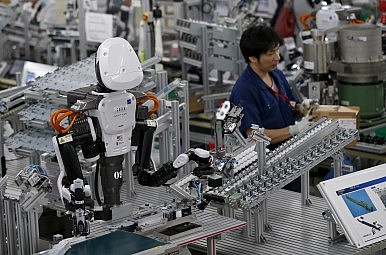Japan’s Robot Revolution
As the nation grapples with a shrinking workforce, are robots the solution?

By Anthony Fensom
July 10, 2015
Robots are serving customers in Japanese department stores and banks, as well as building advanced machines for the nation’s manufacturers. Has the future already arrived in Japan, or is the “robot revolution” sought by Prime Minister Shinzo Abe an impossible dream?
Opening Japan’s official Robot Revolution Initiative Council on May 15, Abe called on the nation’s corporate sector to “spread the use of robotics from large-scale factories to every corner of our economy and society.”
Backed by 200 companies and universities and chaired by Mitsubishi Electric’s Tamotsu Nomakuchi, the council aims to expand robotics throughout Japanese industry, with a goal of growing sales from 600 billion yen ($4.9 billion) a year to 2.4 trillion yen by 2020.
According to the council, robot technologies “possess the potential for solving social challenges, such as resolving labor shortages, releasing people from overwork, and improving productivity in a variety of sectors, ranging from production in the manufacturing industry, to medical services and nursing care, and to agriculture, construction and infrastructure maintenance.”
As the nation grapples with a shrinking workforce, are robots the solution?

By Anthony Fensom
July 10, 2015
Robots are serving customers in Japanese department stores and banks, as well as building advanced machines for the nation’s manufacturers. Has the future already arrived in Japan, or is the “robot revolution” sought by Prime Minister Shinzo Abe an impossible dream?
Opening Japan’s official Robot Revolution Initiative Council on May 15, Abe called on the nation’s corporate sector to “spread the use of robotics from large-scale factories to every corner of our economy and society.”
Backed by 200 companies and universities and chaired by Mitsubishi Electric’s Tamotsu Nomakuchi, the council aims to expand robotics throughout Japanese industry, with a goal of growing sales from 600 billion yen ($4.9 billion) a year to 2.4 trillion yen by 2020.
According to the council, robot technologies “possess the potential for solving social challenges, such as resolving labor shortages, releasing people from overwork, and improving productivity in a variety of sectors, ranging from production in the manufacturing industry, to medical services and nursing care, and to agriculture, construction and infrastructure maintenance.”



Comment